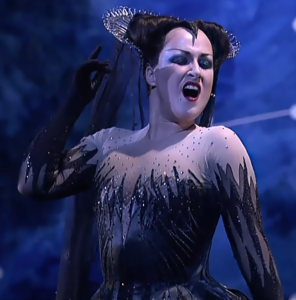Discovering the Myers Briggs Type Indicator has done wonders for my understanding of humankind. It’s helped me better understand myself, helped me better understand and appreciate other people’s viewpoints, and served as an outstanding tool for analyzing the fictional characters I love. Having realized by typing the main cast of La Bohéme just how enlightening it can be to apply the MBTI to opera characters, I’ve decided to use the system to analyze quite a few more operas. Beginning with my first opera, the one from which I’ve taken my screen name, and the one of which I’m currently writing a YA novel retelling (An Eternal Crown): Mozart’s Die Zauberflöte.
For anyone who needs reminding, the sixteen Myers Briggs personality types each consist of four functions, or preferences. Extraversion or Introversion, Intuition or Sensing, Thinking or Feeling, and Judging or Perceiving. We all do both of each, but we each lean more toward one than the other. I first learned about this system of psychological analysis from 16Personalities.com and have since found many other websites and books that have brought me new insights into the subject, such a PersonalityHacker.com, PersonalityGrowth.com, and ALittleBitOfPersonality.com.
Here are the definitions of each preference:
Extraversion (E) vs. Introversion (I): Looking outside yourself first, prioritizing the external world and input from other people, vs. looking inside yourself first, prioritizing your inner thoughts, emotions and pre-existing knowledge. This is different from social extraversion vs. social introversion, though they often correlate. It’s about your way of thinking and of processing information.
INtuition (N) vs. Sensing (S): Focusing on broad concepts and using those concepts to understand literal facts, vs. focusing on literal facts and using those facts to understand concepts.
Thinking (T) vs. Feeling (F): Focusing first on logical use vs. focusing first on emotional meaning. This has nothing to do with your intelligence or how emotional you are in general. It’s about the way you evaluate and make decisions.
Judging (J) vs. Perception (P): Planning and acting first, taking actions based on principles and then observing the results, vs. exploring and observing specific circumstances first, then responding to them.
Each personality type’s cognitive thought process consists of four out of eight cognitive functions, or steps: Extraverted Thinking (Te) or Introverted Thinking (Fe), Extraverted Feeling (Fe) or Introverted Feeling (Fi), Extraverted Intuition (Ne) or Introverted Intuition (Ni), and Extraverted Sensing (Se) or Introverted Sensing (Si). Every person has one T function, one F function, one N function and one S function. Whether that person is an Extravert or an Introvert is determined by whether their first, or dominant function, the one they use most of all, is Extraverted (drawing on external cues) or Introverted (drawing on inner beliefs, emotions or knowledge). Whether they’re a Sensor or an Intuitive depends on whether they use their Sensing function more often than their Intuition function or vice-versa; ditto Feeling and Thinking. Finally, people whose first two functions include either Te or Fe are Judgers, while those whose first two functions include either Ne or Se are Perceivers.
Now, without further ado, here are my MBTI typings for the six leading characters of Die Zauberflöte:
Tamino: ENFJ (“The Teacher”/“The Protagonist”/“The Giver”/“The Veteran”)
Extraverted Feeling (Fe): Tamino always follows his heart, with decisive, emotion-driven actions in response to external cues. He sees a portrait of a beautiful girl? Instantly he loves her and is eager to act on that love. He learns that his beloved has been kidnapped? He’ll set out straight away, kill the kidnapper and rescue her. The kidnapper turns out to be a wise, virtuous high priest? He’ll serve him now, obey his orders and embrace his values as his own, shifting from the mindset of old-school chivalry and “righteous” violence to the Masonic/Enlightenment-era views that the priests espouse. Even when he represses his emotions during the trials in Act II, he does it in an Extraverted Feeling way, not in a Thinking way. It doesn’t serve a practical purpose to hide his love from a heartbroken Pamina or to walk headlong into a blazing fire and face almost certain death. But he’s willing to do them anyway because they’re the “manly” and “virtuous” choices, as defined by his chosen group, Sarastro’s brotherhood. Like a typical Extraverted Feeler, he serves the larger group whatever the personal cost and strives for harmony on a large scale.
Introverted Intuition (Ni): Throughout the opera, Tamino thinks more in abstract concepts than in literal facts, and those concepts reflect a staunch, streamlined view of what the world should be like and how people should behave. “Virtue,” “love,” “truth,” “wisdom,” “manliness,” “justice”… these are the things he speaks of, strives to embody and expects from others too. As outlined above, these abstract values matter more to him than any pragmatic concerns or situation-specific details. This fact highlights both his Feeling nature and his Intuitive nature.
Extraverted Sensing (Se): Although it’s less of a defining trait in him than in Papageno, Tamino is adept at living in the present moment. He accepts each new life-changing revelation as it comes and each new responsibility imposed on him. Unlike Si-user Pamina, he never yearns for what’s been lost. (Granted, the Queen isn’t his mother). Like a stereotypical man, he loves visually, falling in love with the beauty of Pamina’s portrait: again, unlike Pamina, whose dreams of love make her fall for the idea of him. It’s both classic fairy-tale and classic Se.
Introverted Thinking (Ti): In the Act I scene with the Speaker and in the Act II “Wie? Wie? Wie?” quintet, we see Tamino in the grip of inferior Ti. In both scenes he’s harsh and critical, insists that the beliefs of his group are the objective truth, and swallows all emotions but anger and disdain in favor of what he thinks is logic. Yet we see him use his Ti for good too, as he embraces Enlightenment reason, learns to think before he acts and searches for genuine truth. Both his much-lauded virtues and his arguable flaws have Ti as a part of them.
A classic ENFJ is warm, idealistic, passionate, driven, kind, loving, an excellent problem-solver, often wise behind their years, and eager to serve others: in short, a perfect fairy-tale hero. Tamino shares his type with quite a few famous activists and humanitarians, including Martin Luther King Jr., Mother Teresa and Barack Obama. This personality type is also very group-oriented and lives for connection with others, which we see in Tamino in in both positive and negative ways. At the beginning, he’s far from his home and effectively has no group. First he latches on to the Queen, the Ladies and the image of Pamina as his new group, but as soon as he meets Sarastro and his brotherhood, he adopts them as his group instead. Unfortunately, as immature ENFJs sometimes do, he lets both groups control him too much, first blindly believing and obeying the Queen and Ladies, then blindly obeying the priests, spouting their sexist rhetoric, and treating Pamina as his reward for serving his group instead of as a member of it. But in the end, he triumphs by embracing Pamina not as his reward, but as his group’s most valuable member. Thus he remains loyal to the group as a whole, yet achieves a happy ending that transcends it too.
Pamina: INFP (“The Idealist”/”The Mediator”/”The Healer”/”The Ranger”)
Introverted Feeling (Fi): Pamina lives by deep feeling and unchanging values that come from within. Independent of anyone else, she refuses to ever lie or harm anyone else and she glorifies friendship and especially love. Unlike with Tamino, her ultimate shift in loyalty from her mother to Sarastro isn’t a change in values: instead it’s the only way she finds she can stay true to her values. Nor does she even need to see Tamino to fall in love with him. Just hearing about him and knowing he loves her appeals to her innermost dreams of romance and earns her devotion. Last but not least, she values personal love relationships above all else. Despite knowing the virtue of Sarastro’s brotherhood, she can’t choose them over her beloved mother until the Queen violates her personal morals and betrays their personal bond. From then on, Tamino becomes her life, and she can’t comprehend how he can push their love aside in favor of serving other ideals. If he does, she wrongly assumes, he must not really love her. Yet her prioritizing of their love saves Tamino’s life when she goes against the established rules by joining him in the trials. Thus we see the merit both of his Fe approach to life and of her Fi.
Extraverted Intuition (Ne): Like Tamino, Pamina favors abstract concepts more than literal facts. But she seems more open to possibilities. Her shift from the Queen’s side to Sarastro’s is slower than Tamino’s, as she envisions a future where she can go back to her mother yet still love Tamino and respect Sarastro. Later, even when she’s firmly allied with Sarastro, she chafes against the rules that send Tamino to risk his life without her and ultimately defies them to everyone’ benefit. To the end, she sees beyond the narrower visions of others around her.
Introverted Sensing (Si): At the beginning, Pamina’s greatest wish is to go back to her old life with her mother. “A child’s duty” initially blinds her to the Queen’s flaws and to the positive potential of a life in Sarastro’s realm. Nor can she imagine a life without her long-held vision of love: she would rather die. Yet this makes her beautifully loyal, and her roots in the past serve her well too, when she remembers the magic flute’s creation and its protective power. Her Ne and Si together let her bring the best of her mother’s old world into a bright new future.
Extraverted Thinking (Te): When she needs to, Pamina has no trouble taking decisive practical action, whether it be escaping from Monostatos, facing Sarastro with the truth after running away, or joining Tamino in the final trials and instructing him to play the magic flute. But she tends to misuse or underuse her Te too. In the beginning her love (Fi) and duty (Si) toward her mother keep her from accurately and objectively seeing both the Queen and Sarastro for who they are. Later she jumps to the conclusion that Tamino doesn’t love her and clings to that conclusion despite all evidence against it, culminating in her rash suicide attempt. Throughout the opera, like Tamino’s Ti, her Te manifests in both good and bad ways.
As an ISFP, very close to an INFP, it’s no wonder that for years I’ve called myself “Pamina” on social media. In fiction, INFPs are well represented among innocent, dreamy young heroines with a coming-of-age arc (e.g. Shakespeare’s Juliet, Cosette in Les Misérables, or in a non-romantic example, Dorothy in The Wizard of Oz), as well as naïve, idealistic young male lovers who, like Pamina, too easily doubt their beloved’s feelings and/or turn suicidal if they think they’ve lost her (e.g. Romeo, Les Misérables’s Marius, or Alfredo in La Traviata and his spiritual son Christian in Moulin Rouge!).
It’s interesting that Pamina’s soulmate Tamino should be an ENFJ: the cognitive function “stacks” of those two types are parallel, with Feeling, Intuition, Sensing and Thinking in that order, but none of their actual functions the same. Most notably, where Tamino chiefly lives by the outward-focused Extraverted Feeling (Fe), Pamina favors the more introspective, personal Introverted Feeling (Fi). Tamino’s values are those of his group and he devotes himself to serving that group, whatever the personal cost; Pamina’s core values are her own, independent of others, and strong personal bonds matter more to her than any group. This difference arguably causes them more pain than “masculinity vs. femininity” does. But in the end they achieve a beautiful balance: Pamina joins the initiates with Tamino, embracing his group as her own too, while Tamino finds his place in the group by embracing his love for Pamina. ENFJ and INFP “reach the godhead” together.
Papageno: ESFP (“The Entertainer”/“The Performer”/“The Joker”/“The Morale Officer”)
Extraverted Sensing (Se): Papageno lives almost completely in the moment and is chiefly concerned with literal things. Except for love, he couldn’t care less for the abstract ideals most of the other characters live for, but just wants to be safe, enjoy good food and wine, catch birds, listen to them sing, and find a pretty wife. Even when he fantasizes about love, his fantasies highlight the physical: i.e. kisses, cradling his wife in bed, and begetting children. Nor, apart from his dreams of love, does he ever think much of the future. Even after being warned that he’ll be punished if he fails the trial of silence, his boredom in the moment makes him babble away, and even his dream of love is briefly tossed aside when he’s told he needs to face danger to earn it (“I’ll stay single!”). As a man whose job consists of looking through nature for birds to catch, it makes sense that he should chiefly focus on the external, the literal, the physical and the present.
Introverted Feeling (Fi): It’s fitting that Papageno, not Tamino, should be the one who sings the “Mann und Weib” duet with Pamina, because like her, he places utmost value on personal love. It’s his greatest desire, he glorifies it and he always values it above duty to the larger group. For that matter, all his personal feelings matter more than any larger duty or any pragmatic concerns. Regardless of whether anyone approves or not, and regardless of any bad results, he always gives into his fear, his desire for pleasure, etc. From beginning to end, this quirky, emotional birdman follows his own path and lives for love and joy.
Extraverted Thinking (Te): Though he doesn’t often use it, Papageno has a streak of down-to-earth pragmatism that he translates into quick, decisive actions. When afraid, he’s instinctively ready to tell lies to protect himself. When both he and Pamina are nearly captured by Monostatos, he saves the day by remembering to play his magic bells. Throughout the Act II trials, he stubbornly refuses to face each danger until either enticement or threat drives him onward. His smart, stubborn streak of Te is his key to self-preservation.
Introverted Intuition (Ni): When forced to consider the possible dangers ahead, Papageno catastrophizes. Sarastro will have him “plucked, roasted and fed to the dogs,” the temple trials will mean certain death, etc. Likewise, he assumes that without a wife, he’ll either die of grief or should kill himself. These melodramatics are typical bursts of underdeveloped Ni from a dominant Sensor. But we see him use his Intuition in a beautiful way too, as he envisions the bliss of romance, and as he espouses a worldview that glorifies love, friendship and harmony. A worldview that’s not really so different from Sarastro’s and his priests’.
An ESFP’s four cognitive functions are Extraverted Sensing, (Se) Introverted Feeling (Fi), Extraverted Thinking (Te) and Introverted Intuition (Ni). They’re chiefly driven by Se (observing the literal facts and sensations outside themselves) and Fi (finding emotional meaning in those facts and sensations). That sounds like Papageno to me! According to A Little Bit of Personality’s fictional character typings, ESFP and ESTP are two of the most common personality types that writers use for comic sidekicks. ESTP sidekicks are usually the swaggering, wisecracking Jerk with a Heart of gold type, while ESFPs like Papageno are the sweet, innocent, fun-loving goofballs. (For a non-operatic comparison, see Disney’s The Lion King, which has one of each in Timon and Pumbaa.) It’s also common to see ESFPs as the young, wide-eyed, audience surrogate protagonists of children’s fiction, such as Big Bird (how fitting) or Wilbur the pig from Charlotte’s Web. Characters of this type are everywhere, with similar warmth, cheer, funny ineptness, sensitivity, proneness to terror, and love of people and simple pleasures. But Papageno is more than just a stock comic sidekick; he’s one of the best, most convincing and endearing examples of that character type ever created. Of course not every ESFP in fiction gets to sing music by Mozart!
The Queen of the Night: ESFJ (“The Provider”/”The Consul”/”The Caregiver”/”The Calvary”)
Extraverted Feeling (Fe): Yes, the Queen shares her dominant function with Tamino. But of course it manifests differently. Instead of focusing on how to serve the people she cares about, she focuses on how to make others view her with fear and awe, how to manipulate them, and how to reward or punish them depending on whether or not they serve her. Yet as with Tamino, her every word and action revolves around emotional meaning. In her first aria, she appeals to Tamino’s Fe by stoking his sympathy for her suffering and Pamina’s, while in her second she manipulates Pamina’s Fi by evoking their personal bond and threatening to sever it. Nor do we ever learn what she wants to do with the Disc of the Sun’s power or what practical purpose Sarastro’s death will serve for her. Instead her focus is emphatically on revenge; not just eliminating Sarastro, but making him “feel the pain of death.” Emotion-driven actions are everything to her.
Introverted Sensing (Si): The Queen can’t let go of the wrongs done to her in the past. Her husband’s choice of Sarastro over herself as heir to his power and Sarastro’s kidnapping of her daughter drive her every action. In her Act I aria, she describes Pamina’s terror as she was stolen in vivid detail, and in her dialogue with Pamina in Act II (in the uncut libretto), she recites her husband’s entire deathbed speech from bitter memory. She’s also an effective symbol of an outdated world order, like the rule of the aristocracy and church in Mozart’s day. She tries in vain to battle the new Enlightenment, regain the power she once shared with her husband and uphold the old ways. While of course a healthy Si-user can let go of grudges and be open to change, the failure to do so is a classic trait of unhealthy Si.
Extraverted Intuition (Ne): The Queen is always looking to new possibilities to achieve her goal of revenge. First she looks to Tamino as her agent, then turns to Pamina, and finally tries to launch an attack herself with the Ladies’ and Monostatos’s help. Also, as much as she might symbolize “old ways” with her Si, she also looks toward a hitherto-unknown future where a woman can reign supreme, which tragically for her, Sarastro’s vision of “a woman’s sphere” can’t conceive. In this way, her Ne contrasts with the Ni of her nemesis.
Introverted Thinking (Ti): The Queen knows how to formulate plans, but because this is her lowest function, she doesn’t fully consider the practical details. While she rightly determines that Tamino will fall in love with Pamina’s portrait and that his love and compassion will drive him to try to rescue her, she doesn’t predict how easily the idealistic young prince will switch to Sarastro’s side. Nor does she predict that Pamina’s integrity won’t let her commit murder, not even for her mother’s sake; nor does she foresee the power that defeats her in the end. While she has the potential to be a “mastermind” villain, she falls short because her Thinking and Intuition are underdeveloped beneath her Sensing and Feeling.
Sensing: Let’s examine the text of the Queen’s Act I aria. She could have dwelt on the suffering she imagines Pamina facing as Sarastro’s “prisoner,” or on the bleakness of her own future if she never gets her back, or on the joy of the reunion she longs for. But instead she focuses on solid details of the past and present: Pamina’s terrified struggle as she was kidnapped and her own current sorrow at having lost her. Nor in her Act II dialogue with Pamina or her subsequent aria does she describe anything abstract, only on the details of how she lost the Disc of the Sun, what she wants Pamina to do to get it back, and the price Pamina will pay if she refuses. This seems to be one of the main differences between her and the heroes, who are mostly Intuitives. They’re able to live staunchly by concepts such as virtue, love, truth and forgiveness, and overlook the facts (dangers, others’ cruelty, etc.) that tempt them to stray from all those concepts. The Queen, on the other hand, never looks beyond the facts of how she feels she’s been wronged or the potential ways to retaliate.
Feeling: This is a tricky category for the Queen. On the one hand, she can seem very Thinker-like in the ways she manipulates Tamino, Pamina, and even Monostatos to use them as pawns in her schemes against Sarastro. But no one can listen to her Act II aria’s blazing, raging coloratura and deny that she’s an emotion-driven character… and to a large extent she symbolizes unhealthy emotional excess, in contrast to the enlightened reason and self-control of Sarastro and his priests. (Though Sarastro is actually a Feeler too – see below.) Of course, it all comes down to this: does she value things based on their use or based on their meaning? Ultimately, I’d say the latter. We never even learn what power the Disc of the Sun contains. The Queen doesn’t specify what she lost when Sarastro gained it or how she plans to use it when it’s finally hers. (Those were blanks I’ve needed to fill in while writing An Eternal Crown.) Nor is “rescuing” her daughter really the driving goal she claims it is; her vow to disown Pamina unless she helps her defeat Sarastro disproves that claim. So what really drives her? What does she speak of most emphatically? Revenge. Der Hölle Rache. Her reasons for hating Sarastro and what she’ll gain from his death seem almost irrelevant to her. All that really matters is what she feels: that she’s angry and wants to make him pay.
Judging: The Queen never weighs any options. She knows what she wants, plans and acts decisively, and pursues her goal with a single-minded “you’re with me or against me” mindset. Nor does she stop to consider the potential weaknesses of each plan. It never seems to cross her mind that Sarastro might win Tamino over, or that her Ladies won’t be able to seduce him back after he switches sides, or that Pamina might choose her conscience over her mother’s love. A Perceiver Queen would probably have analyzed her daughter and her would-be son-in-law more closely and tailored their “assignments” to suit their personalities. For example, instead of ordering Pamina to commit murder, she might have given her a poison disguised as a magic potion to give to Sarastro, lying that it would soften his heart and make him set her free. But instead she just assumes “Pamina is my daughter and Tamino loves her, so of course they’ll choose me” and soldiers on in true Judger style.
It’s not too surprising to realize that the Queen of the Night shares her type with many of pop culture’s glamorous, egotistical “party girls” (e.g. Miss Piggy, Glinda in Wicked or Musetta in La Bohéme), as well as many a nurturing mother figure with a red-hot iron will (e.g. Harry Potter’s Molly Weasley). She also shares it with some of pop culture’s favorite villains, such as Harry Potter’s Draco Malfoy and another notorious queen, Game of Thrones’ Cersei Lannister. The Queen isn’t even Mozart’s only ESFJ antagonist: I’m fairly positive that Le Nozze di Figaro’s Count Almaviva is one too. ESFJs are born to shine at the head of their group, whether that group is a family, a group of friends, a castle, or a kingdom. They’re usually a warm, caring and affectionate type, which fits Pamina’s description of the mother who raised her, but unhealthy ones can also be controlling, arrogant, and greedy for attention and status. They tend to favor traditional values and social structures as well. This makes a dark ESFJ a natural villain to represent the Baroque aristocracy’s outdated lifestyle, in contrast to the “modern” Enlightenment values of the heroes.
Sarastro: INFJ (“The Counselor”/”The Advocate”/“The Protector”/”The Mystic”/“The Paladin”)
Introverted Intuition (Ni): Sarastro’s every word and action reflect his vision of what the world should be. He devotes his life to building a community of wisdom, reason, courage, selfless love and integrity: in short, all the values of the Age of Enlightenment and particularly the Masons whom his initiates represent. These values staunchly define his concept of “good” and the lack of them defines his concept of “evil.” More controversially by modern standards, he also preaches a very 18th century vision of gender roles, with “man” elevated as a symbol of strength and intelligence, and “woman” as a weaker being who depends on male guidance. These visions of human nature and morality are abstract: it’s natural that the Queen should reject them, as she’s both a Sensor (focused on the concrete past) and an Ne user (who sees different possibilities for the future). But Sarastro lives for these visions and no outside force can sway him from them. His role as a leader and mentor is to sway other people toward them.
Extraverted Feeling (Fe): Surprising though it might seem to view the stoic, self-control urging Sarastro as a Feeler, he is one. Values – not pragmatic action, but values – are his lifeblood. In the same vein as his protégée Tamino, he speaks constantly of “virtue,” “love,” “friendship,” “forgiveness” and “happiness”. These are the motives for everything he does. Nor is he content to be the only person who lives by those values. He’s built a community with them and makes it his mission to teach others to live by them too. Judging by the tests he imposes, he also seems to thoroughly value loyalty and obedience to the brotherhood over personal desires. Universal harmony and “love of fellow man” are his ultimate goals.
Introverted Thinking (Ti): Without this function, Sarastro could never have built his society of law, order and reason. His Ti is the source of the orderly structure of the temples, the brotherhood’s meetings and prayers, and of course the trials the young would-be initiates face. It’s the source of the value his society places on self-discipline and thought before action. It also inspires his more ruthlessly pragmatic, “for the greater good” choices: e.g. kidnapping Pamina, or letting her suffer to test Tamino’s integrity, or the very fact that his trials are potentially fatal. While ultimately a Feeler, he can definitely behave like a Thinker.
Extraverted Sensing (Se): Because this is Sarastro’s lowest function, it’s no wonder that he tends to seem a bit detached from the world around him. In his all-consuming vision of an ideal future, he often ignores the very real hardships of the present: namely Pamina’s natural pain at being separated from her mother, Monostatos’s dangerous designs on her, and her suicidal anguish as a result of Tamino’s trials. Still, he’s not entirely detached. As much as he values forgiveness, he still severely punishes Monostatos when he realizes his crimes, and in the end he values Pamina’s courage and loyalty enough to depart from his Ni-based rules and initiate her. In these rare cases, he prioritizes the facts of the present.
The male INFJ is a ubiquitous figure in pop culture, despite being statistically the rarest Myers-Briggs type. Older INFJs in particular tend to be the wise, often mystical father-figure mentors in fiction: Gandalf, Yoda, Mufasa from The Lion King, etc. This type is widely seen among history’s great idealists too, including Mahatma Ghandi and arguably Jesus Christ. It’s also generally agreed that Adolf Hitler was a dark INFJ, which should surprise none of Flute’s detractors who consider Sarastro a glorified tyrant. Light or dark, healthy or unhealthy, INFJs have a vision of a perfect world and strive to bring the real world in line with that vision. For an idealistic high priest who leads the young protagonists toward enlightenment, no other personality type is more fitting.
Monostatos: ISTP (“The Virtuoso”/“The Mechanic”/The Crafter”/”The Weapons Specialist”)
Introverted Thinking (Ti): It might be surprising to see Monostatos labeled a Thinker, not a Feeler, since his main motive is his passion for Pamina. But just as Sarastro and Tamino approach their Enlightenment stoicism in a Feeling way (embracing it not for pragmatic use, but as a virtue), Monostatos approaches his passion in a Thinking way. He’s constantly scheming and trying new pragmatic actions to achieve his goal of winning Pamina: force, blackmail, kowtowing to Sarastro, or kowtowing to the Queen. He does all of this with no sentimentality and no idealism. In the uncut libretto, he even calls love a “damn foolish thing.” Where the opera’s heroic characters (all Feelers) revere love as the path to human divinity, for Monostatos it’s just an uncomfortable source of “burning” within him, which he wants to alleviate with any practical means he can. His ruthless, “whatever it takes” approach to life is a hallmark of unhealthy Thinkers.
Extraverted Sensing (Se): For all his rage about being despised for his skin color, Monoastatos never dreams of escaping the life of a slave. Instead he takes advantage of th order, bullying the slaves under his command, abusing his power over Pamina as her guard, and obsequiously serving first Sarastro and then the Queen. As with Papageno, his focus is on the literal and the present, not on abstractions or far-off possibilities. Also like Papageno, he views love in physical terms: “billing and cooing, hugging, kissing.” This is partly because both characters represent “base instincts,” but also because they both use Se.
Introverted Intuition (Ni): Supporting Monostatos’s Se is his underlying conviction of how “the system” works. He “knows” that by utilizing the pecking order, bullying those beneath him and groveling to those above him, he can get his way… and he clings to that vision even as those methods repeatedly and comically fail him. In his Act II aria, he also voices the sweeping view that all flesh-and-blood creatures are entitled to act on their instinct to love. A valid assertion, even though the way he acts on it is appalling.
Extraverted Feeling (Fe): Monostatos is painfully aware of his outsider status. He knows it’s “wrong” for him to pursue a white girl, and even begs the moon to forgive him for it, but he still desperately craves Pamina and fumes in his belief that she only rejects him because he’s black (or green, or blue, or whatever). Underlying all his hard edges and pragmatic scheming is a wild longing for love (or at least for sex) and his failure to get it results in vicious anger, culminating when he snaps and tries to stab Pamina for spurning him. Like all Fe users, he wants to emotionally “belong,” but his actions ensure that he never will.
ISTPs are stereotyped as natural craftspeople or athletes, but even when they’re neither of those things, they specialize in wielding “tools” in pragmatically useful ways. Monostatos’s “tool” is manipulating the social pecking order: he plays the sycophant to his masters and abuses any power he’s given. In him we also see what A Little Bit of Personality calls the ISTP’s “Type Angst” – a painful sense of not fitting in. This is allegedly common among ISTPs due to their weak Fe and Monostatos’s literal outsider status as a Moorish slave only makes it worse. Therefore, he rejects any empathy or respect for the people who “reject” him, and uses the social order only to achieve his own selfish ends.
I won’t write full profiles for anyone else, but if I had to, I’d say that the Three Ladies are all ESFJs like their mistress the Queen, the Three Boys are INFJs like Sarastro, Papagena is an ESTP and the Speaker is an INTJ.
It’s fascinating to notice the recurring patterns in the personality types of this particular opera. Namely the predominance of Feelers and the association of Intuition with the idealistic heroes and Sensing with the baser instinct-driven villains and bumblers. I feel tempted to apologize on Mozart and Schikaneder’s behalf to all real Sensors and Thinkers: in real life, Sensors can be just as dignified and idealistic as any Intuitive (at least I should hope they can – I’m a Sensor myself), while Thinkers can be just as loving and compassionate as any Feeler, just in different ways. Still, those patterns provide interesting insights into the Enlightenment-era Freemasons’ definition of “virtue. Or at least into the definition of “virtue” held by Mozart, whom I tend to see typed as either an ISFP, an ESFP or an ENFP, and/or by Schikander, whom I think must have been an NF of some kind or other).
I can’t wait to use this method to analyze more opera characters and keep finding new insights.









